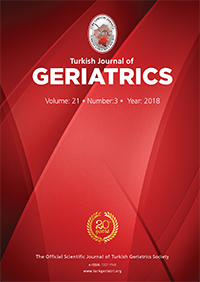Materials and Method: A prospective study of elderly (>75 years) patients who underwent total/partial hip arthroplasty due to femoral neck or intertrochanteric fractures was conducted. Patients were randomised into two groups. The first group underwent transfusion when haemoglobin values reduced below 9.0 mg/dL, whereas the second group underwent earlier blood transfusion according to the volume of blood loss during and after surgery. All groups were similar in terms of factors considered to be associated with postoperative cognitive dysfunction. An experienced neurologist assessed patients" cognitive functions using the Standardized Mini-Mental Status Examination test and clinical examinations pre- and postoperatively.
Results: In total, 48 patients in the first group and 13 in the second group (early intervention group) were diagnosed with postoperative cognitive dysfunction. The duration of cognitive dysfunction was significantly lower in the second group (10.8±1.2 vs. 8.9±1.5 days; p<0.001).
Conclusion: Although the causal relationship between blood loss and postoperative cognitive dysfunction has not been elucidated in this study, our results demonstrate that postoperative cognitive dysfunction frequency and duration may be reduced by early replacement of blood loss in elderly patients who undergo total/partial hip arthroplasty.
Keywords : Arthroplasty, Replacement, Hip; Cognitive Dysfunction; Blood Loss, Surgical; Blood Transfusions
